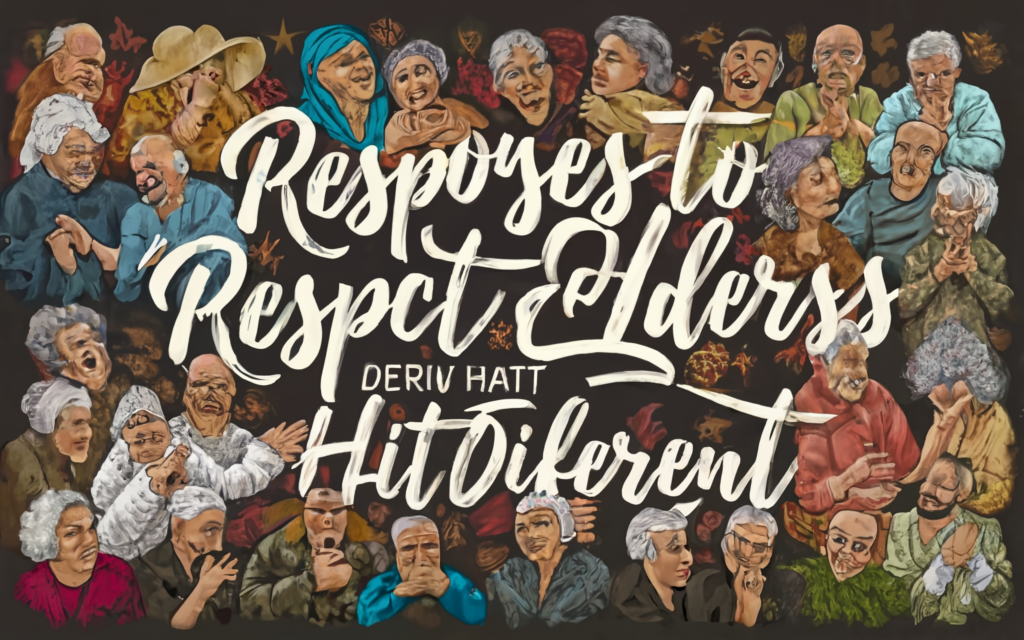The phrase “Respect Your Elders” is a time-honored expression, often used to remind younger generations of the importance of valuing the wisdom and experience of those who have lived longer.
However, in today’s diverse and evolving society, the meaning and relevance of this phrase can vary greatly depending on the context.
This article explores 30 unique and thoughtful responses to the statement “Respect Your Elders,” offering fresh perspectives that resonate with modern sensibilities.
Respect is Earned, Not Demanded
Respect should be a mutual exchange, not something that is expected solely based on age. It’s important to recognize that respect is something that individuals must earn through their actions and character.
Explanation:
In today’s world, respect isn’t automatically granted based on age alone. While experience and wisdom are valuable, they do not excuse poor behavior or a lack of understanding. This response emphasizes that respect is a two-way street and must be earned through trust, integrity, and kindness.
For Example:
“I believe that respect is something we should earn through our actions, not something we can demand just because we’re older.”
Age Does Not Equal Wisdom
Age does not always correlate with wisdom. Sometimes, younger generations may have insights that older individuals can learn from.
Explanation:
While age often brings experience, it doesn’t necessarily mean that older individuals are always wiser. This response highlights that wisdom can come from anyone, regardless of age, and that mutual respect should be based on the value of ideas rather than the age of the person presenting them.
For Example:
“Just because someone is older doesn’t mean they’re always wiser. We can all learn from each other.”
Respect Goes Both Ways
Respect should be reciprocal, regardless of age. Mutual respect forms the foundation of healthy relationships.
Explanation:
This response underlines the importance of mutual respect in any relationship. Regardless of age, showing respect to others should come with the expectation that they will reciprocate. It’s a reminder that respect is a shared responsibility.
For Example:
“Respect should go both ways. If you want to be respected, you must also show respect.”
Actions Speak Louder Than Age
It’s not age, but actions that truly define whether someone deserves respect.
Explanation:
This response emphasizes the importance of judging people by their actions rather than their age. It reinforces the idea that respect should be based on how individuals treat others, regardless of their years.
For Example:
“Your actions, not your age, determine whether you earn my respect.”
Understanding Over Obedience
Blind obedience to elders can be detrimental; understanding and communication are key.
Explanation:
This response suggests that while respecting elders is important, it shouldn’t come at the cost of critical thinking and open dialogue. Respectful relationships thrive on understanding and communication, not blind obedience.
For Example:
“I believe in understanding rather than just obeying because it leads to better relationships.”
Elders Should Also Learn From the Young
The relationship between the young and old should be symbiotic, with both sides learning from each other.
Explanation:
This response encourages a two-way learning process between generations. It stresses the idea that just as younger people should respect their elders, elders should also be open to learning from the younger generation.
For Example:
“Learning goes both ways; we can teach each other something valuable.”
Respect is Based on Character, Not Age
Character is a stronger basis for respect than mere age.
Explanation:
This response emphasizes that respect should be rooted in a person’s character and behavior rather than their age. It’s a reminder that qualities like kindness, honesty, and integrity are more deserving of respect than simply being older.
For Example:
“I respect people for their character, not just their age.”
Experience Matters, But So Does Empathy
Experience is important, but empathy and understanding are equally valuable.
Explanation:
This response acknowledges the value of experience but also highlights the importance of empathy and understanding in earning respect. It suggests that elders should be empathetic toward the younger generation to foster mutual respect.
For Example:
“Your experience is valuable, but so is your empathy.”
Respect Shouldn’t Be Forced
Respect that is forced is not genuine; it should be given freely.
Explanation:
This response challenges the notion that respect can be demanded or forced. It suggests that true respect is something that must be earned and given freely, rather than imposed.
For Example:
“Forced respect isn’t real. It should be given freely.”
Elders Should Lead byFor Example:
Elders should demonstrate the behavior they wish to see in younger generations.
Explanation:
This response encourages elders to lead byFor Example:. It suggests that if they want respect from the younger generation, they should embody the qualities and behaviors that deserve respect.
For Example:
“If you want respect, you need to lead byFor Example:.”
Mutual Respect Fosters Better Understanding
Mutual respect is the foundation of understanding and collaboration between generations.
Explanation:
This response highlights the importance of mutual respect in fostering understanding and cooperation. It emphasizes that respect should be a two-way street, creating a better environment for learning and growth.
For Example:
“Mutual respect is key to fostering better understanding between us.”
Respect is a Choice, Not an Obligation
Respect should be a conscious choice, not an obligation imposed by others.
Explanation:
This response underlines that respect is a personal decision, not something that should be forced or expected without reason. It’s a reminder that respect is most meaningful when it’s freely given.
For Example:
“Respect is something I choose to give, not something I’m obligated to.”
Wisdom Comes from Many Sources
Wisdom isn’t limited to age; it can come from various life experiences and perspectives.
Explanation:
This response broadens the understanding of wisdom, suggesting that it can come from a variety of sources, not just age. It encourages a more inclusive view of where valuable insights can originate.
For Example:
“Wisdom can come from many sources, not just from those who are older.”
Questioning is a Sign of Respect
Questioning and seeking understanding are forms of respect, not disrespect.
Explanation:
This response redefines the act of questioning as a form of respect. It suggests that by seeking to understand and clarify, younger people are showing respect for the knowledge and experiences of their elders.
For Example:
“Asking questions is a way to show respect for your knowledge.”
Age Doesn’t Exempt You from Accountability
Being older doesn’t mean one should be exempt from being accountable for their actions.
Explanation:
This response stresses that age should not shield someone from being held accountable. It reminds us that everyone, regardless of age, should be responsible for their actions and behaviors.
For Example:
“Age doesn’t make you immune to being held accountable.”
Respect Should Be Universal
Respect should not be limited to elders; it should be shown to everyone, regardless of age.
Explanation:
This response advocates for universal respect, suggesting that it shouldn’t be reserved for elders alone. It emphasizes the importance of respecting all individuals, regardless of their age.
For Example:
“Respect should be shown to everyone, not just those who are older.”
Elders Should Be Open to Change
Elders should be willing to adapt and change with the times to maintain respect.
Explanation:
This response encourages elders to remain open to change and to embrace new ideas. It suggests that being adaptable and open-minded is a way to earn respect from younger generations.
For Example:
“Being open to change is key to earning respect in today’s world.”
Respect is About Actions, Not Authority
Authority alone does not warrant respect; it’s the actions behind that authority that matter.
Explanation:
This response distinguishes between authority and respect, emphasizing that true respect is earned through positive actions, not merely by holding a position of authority.
For Example:
“Authority doesn’t guarantee respect; it’s your actions that count.”
Every Generation Has Value
Every generation brings something valuable to the table, deserving of respect.
Explanation:
This response acknowledges that each generation has its unique strengths and perspectives. It encourages mutual respect based on the recognition of the value that different generations bring.
For Example:
“Every generation has its own value and deserves respect.”
Elders Should Listen as Much as They Speak
Listening is a key component of respect, and elders should practice it as much as they speak.
Explanation:
This response emphasizes the importance of listening in respectful relationships. It suggests that elders should be as willing to listen to the younger generation as they are to share their own experiences.
For Example:
“Listening is just as important as speaking when it comes to respect.”
Respect the Person, Not Just the Age
Respect should be given to the person as an individual, not just because of their age.
Explanation:
This response highlights the importance of seeing people as individuals rather than just a number. It suggests that respect should be based on personal qualities and actions, not just age.
For Example:
“I respect you for who you are, not just because of your age.”
Respect and Understanding Go Hand in Hand
Respect and understanding are closely intertwined, and both are essential for building meaningful relationships.
Explanation:
This response emphasizes the connection between respect and understanding. It suggests that to truly respect someone, you must first seek to understand their perspective, experiences, and feelings. Without understanding, respect can be shallow and insincere.
For Example:
“Understanding your point of view is key to showing respect.”
Elders Should Adapt to New Norms
Respecting elders does not mean accepting outdated norms; elders should be willing to adapt to changing societal values.
Explanation:
This response encourages elders to be flexible and adaptable to modern norms and values. It suggests that respect should be mutual, and part of that is recognizing and embracing the changes in society that younger generations bring.
Example
“To earn respect today, it’s important to adapt to the new norms.”
Experience is Valuable, But So is Innovation
While experience is important, innovation and fresh ideas should also be respected.
Explanation:
This response highlights the balance between valuing the experience of elders and recognizing the importance of innovation and new ideas. It suggests that both experience and innovation should be respected for their contributions to progress.
For Example:
“Your experience is important, but so is the innovation that younger generations bring.”
Respect Shouldn’t Be Conditional on Age
Respect should be given based on behavior and values, not simply because of someone’s age.
Explanation:
This response challenges the idea that age alone should command respect. It suggests that respect should be earned through consistent behavior and shared values, regardless of age.
For Example:
“My respect is based on your values, not just your age.”
The Golden Rule Applies to All Ages
The principle of treating others as you want to be treated applies to everyone, regardless of age.
Explanation:
This response invokes the Golden Rule, reminding everyone that respect is a universal principle that should apply to people of all ages. It reinforces the idea that treating others with kindness and respect should be a standard expectation, regardless of generational differences.
For Example:
“The Golden Rule applies to everyone, no matter their age.”
Elders Should Be Role Models, Not Enforcers
Elders should aim to be role models who inspire respect, rather than enforcers who demand it.
Explanation:
This response suggests that elders should focus on being role models who naturally earn respect through their actions and behaviors. It emphasizes that respect is more likely to be given when it is inspired rather than enforced.
For Example:
“Inspire respect by being a role model, not by trying to enforce it.”
Age is a Number, Not a Measure of Worth
Age should not be used as a measure of a person’s worth or the respect they deserve.
Explanation:
This response separates the concept of age from a person’s intrinsic worth. It argues that respect should be based on individual merit, character, and contributions, rather than just the number of years someone has lived.
For Example:
“Your worth isn’t defined by your age; it’s about who you are.”
Respect Should Reflect the Times
Respect is not a static concept; it evolves with societal changes and should reflect the times we live in.
Explanation:
This response recognizes that the concept of respect evolves over time and should adapt to current societal norms and values. It suggests that respecting elders today might look different from how it did in the past and should align with contemporary principles.
For Example:
“Respect needs to evolve with the times to stay relevant.”
Elders Can Learn as Much as They Teach
The learning process is ongoing, and elders can benefit from the knowledge and perspectives of younger generations.
Explanation:
This response encourages a dynamic exchange of knowledge between generations. It acknowledges that while elders have much to teach, they can also continue to learn from the younger generation, fostering mutual respect and growth.
For Example:
“Just as you’ve taught us, there’s always something new to learn from the younger generation.”
Respect for Elders Should Include Constructive Dialogue
Respecting elders should involve open and constructive dialogue rather than unquestioning obedience.
Explanation:
This response advocates for respectful, open dialogue between generations. It suggests that questioning and discussing ideas with elders can be a form of respect, as it shows a desire to engage with and understand their perspectives.
For Example:
“Respect means having an open and constructive dialogue, not just blind obedience.”
Age Brings Experience, But Not Always Perspective
Experience comes with age, but perspective requires open-mindedness and adaptability.
Explanation:
This response distinguishes between experience, which naturally comes with age, and perspective, which requires an openness to new ideas and change. It suggests that while experience is valuable, it’s the perspective that truly earns respect.
For Example:
“Experience is one thing, but having a broad perspective is what truly earns respect.”
Respect is Earned Daily
Respect isn’t a one-time achievement; it’s something that must be earned and maintained daily.
Explanation:
This response highlights that respect is not something granted once and forgotten but something that must be continually earned through daily actions and behavior. It emphasizes the importance of consistency in deserving respect.
For Example:
“Respect is earned daily through your actions, not just because of past achievements.”
Final Thoughts on Respect and Elders
Understanding the nuances of respect and its application to our elders can lead to healthier and more balanced relationships across generations.
Explanation:
In conclusion, respect is a complex and dynamic concept that should be based on mutual understanding, open dialogue, and earned trust. As society evolves, so too should our approach to respecting elders, ensuring that it reflects the values of today while honoring the wisdom of the past.
For Example:
“Let’s focus on building respect that’s based on mutual understanding and the values we all share.”

Dariel Campbell is the driving force behind ReplySwift.com. With a passion for crafting quick and impactful responses, Dariel helps others master the art of effective communication. On ReplySwift.com, he shares expert advice, practical templates, and insightful tips to make every reply count. Join Dariel and elevate your communication skills to new heights.












